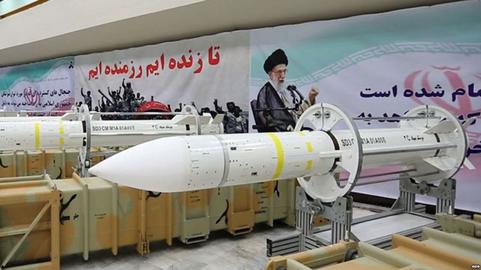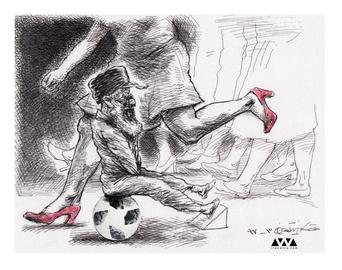US President Donald Trump has cited Iran’s ballistic missile program as one of the main reasons he scrapped the nuclear deal with Iran, officially known as the Joint Comprehensive Plan of Action (JCPOA), even though the agreement did not include conditions pertaining to the missile program. Following the US’ exit from the deal on May 8, the Revolutionary Guards (IRGC) and its affiliates stepped up their campaign to persuade the Iranian public to back the missile program, one of the most important foundations of its overarching financial and political power.
In the run-up to Trump’s announcement to officially withdrew the US from the JCPOA, Western European countries tried, unsuccessfully, to find a way to prevent the move.
Following the withdrawal, the Guards asked its political staff and operatives — called “political guides” in its parlance — to conduct a study to convince Iranians that the IRGC is not adventurist and not taking reckless risks. The 12-page study, entitled “A Perspective on the American Exit: From Its Reasons to Its Consequences and the Scenarios Ahead,” was published in May.
As the title indicates, the study first presents an analysis of the reasons for the exit, in three categories: “personal”, “structural” and “regional.”
At the “personal” level, the study argues that, by withdrawing from the agreement, Donald Trump wanted to relieve political and psychological pressures on himself because of accusations that his election campaign had colluded with Russia and Vladimir Putin. The second reason, says the study, was that Trump wanted to show that he had fulfilled his campaign promise to leave the JCPOA.
At both the “structural” level, which refers to how US foreign policy works, and the “regional” level, the study points to lobbying by Israel and Saudi Arabia as an important factor in Trump’s decision.
The “consequences” section of the report looks at the question from “political and security” and “economic and commercial” perspectives. From a political and security perspective, the study argues that the American exit from the JCPOA will not lead to the downfall of the Islamic Republic. But from a commercial point of view, it concludes that Europe is not in a position to stand up to the United States. “The idea that Europe would get into a trade war with the US over Iran does not seem realistic,” it declares unequivocally.
The paper announces that the position held by President Rouhani and his government with regard to the American exit from the JCPOA and Europe’s commitment to this agreement do not protect Iran’s national interests.
“Guarantees” vs. “Agreements”
In its summary, the study quotes a recent speech by Brigadier General Yadollah Javani, head of the political bureau of the Revolutionary Guards, in which he said Europe cannot remain committed to the JCPOA. At the moment, he said, there are two points of view within the Islamic Republic regarding the strategy ahead: seeking “guarantees” or seeking “agreements.” Supreme Leader Ayatollah Khamenei represents the first perspective, Javani said, while President Hassan Rouhani represents the second approach.
Referring to the IRGC’s ballistic missile program, he said that people must be convinced that “the Guards are not after adventure” and not taking unnecessary or unplanned risks.
The study and General Javani’s statements have been sent to all “political guides” within the Guards and Basij, its affiliated paramilitary organization, encouraging them to quote them in speeches at Basiji bases and religious centers across Iran. The approach is not new. For many years now the IRGC has tried to shape public opinion through its political operatives.
These “political guides” operate under the supervision of the Supreme Leader’s representative at the Revolutionary Guards and the Basij. Their alleged role is to “raise the political insight of IRGC and Basiji forces.” Although these operatives are always active, they double their efforts across Iran whenever a new election approaches.
A New Mission for “Political Guides”
According to IRGC officials, in 2011 the Guards and the Basij had 11,000 “political guides,” and this number increased to more than 14,000 in 2013. It is estimated that it has continued to increase considerably in recent years. Ali Saeedi, the previous Supreme Leader’s representative at the IRGC, had said that the mission of “political guides” was to “guide the voters to choose the more qualified [candidates].” Their mission has now expanded, and they are now also tasked with defending Ayatollah Khamenei, his policies and the Revolutionary Guards in all areas.
Most observers agree that the IRGC’s ballistic missile program was one of the main reasons for the US’s exit from the JCPOA. Now it is the mission of the “political guides” to deny this, and turn around public opinion in Iran.
More on the aftermath of Trump’s withdrawal from the nuclear treaty with Iran:
Iran and its Fleeting Dream of New Airplanes, June 13, 2018
Khamenei Calls for Immediate Action on Nuclear Enrichment, June 6, 2018
President Rouhani's Plane on the US Sanctions List, June 1, 2018
Decoding Iranian Politics: Ayatollah Khamenei’s Stance on the JCPOA, June 1, 2018
The Nuclear Deal: Will Khamenei Get What he Wants?, May 29, 2018
Khamenei’s Eight Conditions for Talks with Europe, May 25, 2018
Revolutionary Guards Respond to Pompeo’s “Empty Bluff”, May 23, 2018
The 12 Demands of Pompeo's New Iran Strategy, May 21, 2018
When Will US Sanctions Hit Iranian Oil Sales?, May 18, 2018
The JCPOA: A Missed Opportunity, May 17, 2018
The Future of Iran’s Economy as the US Bows Out of the Deal, May 10, 2018
What are Iran’s Choices as US Abandons the Nuclear Deal?, May 9, 2018
Khamenei’s “Heroic Flexibility 2.0”, May 9, 2018
What you Need to Know About Trump and the Nuclear Deal, May 8, 2018
visit the accountability section
In this section of Iran Wire, you can contact the officials and launch your campaign for various problems

























comments